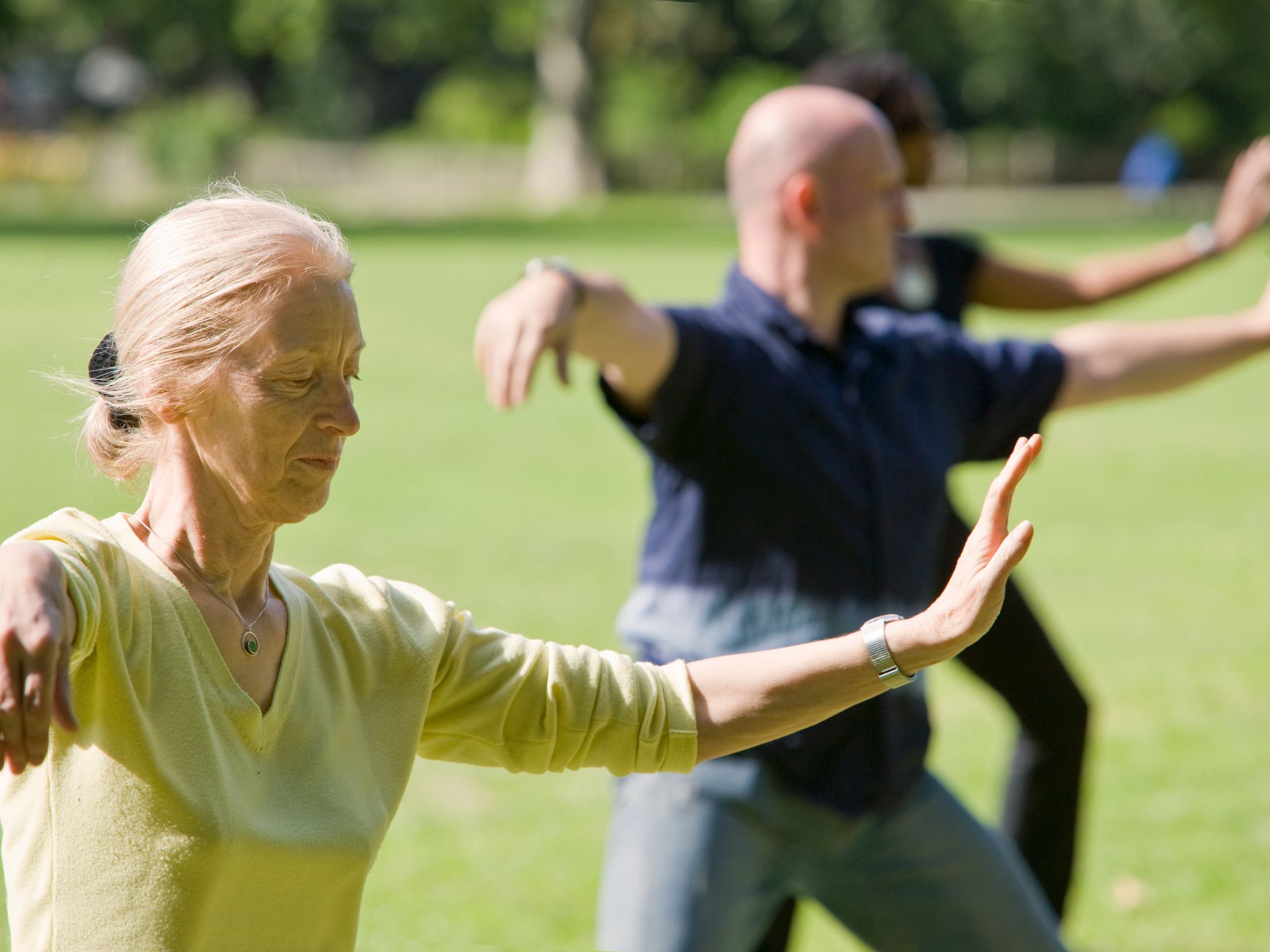If you’re looking for a way to reduce stress, consider Tai Chi. Originally developed for self-defense, tai chi has evolved into a graceful form of exercise that’s now used for stress reduction and a variety of other health conditions. Often described as meditation in motion, tai chi promotes serenity through gentle, flowing movements.
What is Tai Chi?
Tai chi is an ancient Chinese tradition that, today, is practiced as a graceful form of exercise. It involves a series of movements performed in a slow, focused manner and accompanied by deep breathing.
Tai chi is a noncompetitive, self-paced system of gentle physical exercise and stretching. Each posture flows into the next without pause, ensuring that your body is in constant motion.
Tai chi has many different styles. Each style may subtly emphasize various tai chi principles and methods. There are variations within each style. Some styles may focus on health maintenance, while others focus on the martial arts aspect of tai chi.
Tai chi is different from yoga, another type of meditative movement. Yoga includes various physical postures and breathing techniques, along with meditation.
1. Strength and Endurance
Tai Chi has proven to be an exercise with significant benefits in the areas of balance, upper- and lower-body muscular strength and endurance, and upper- and lower-body flexibility, particularly in older adults. In one such study, people in their 60s and 70s practiced Tai Chi three times a week for 12 weeks. They also undertook a myriad of physical fitness tests to measure balance, muscular strength, endurance, and flexibility before and after the 12 weeks.
After just six weeks, statistically, significant improvements were observed in balance, muscular strength, endurance, and flexibility measures. Improvements in each of these areas increased further after 12 weeks.
2. Aerobic Capacity
Aerobic capacity diminishes as we age, but research on traditional forms of aerobic exercises has shown that it can improve with regular training. In another meta-analytic study, researchers looked at seven studies focusing on the effects of Tai Chi on aerobic capacity in adults with an average age of 55 years. The investigators found that individuals who practiced Tai Chi regularly for a year had higher aerobic capacity than sedentary individuals around the same age.
3. Stress Relief
The breathing, movement, and mental concentration required of individuals who practice Tai Chi are the perfect distraction from their hectic lifestyles. The mind-body connection is also important here, as it has been reported that breathing combined with body movement and hand-eye coordination promotes calmness.
4. Internal Organ Health
Tai Chi’s fluid spiraling and bending movements, as well as its breathing and meditation components, massage the internal organs and release them from damaging constrictions brought about by stress, poor posture, and difficult working conditions. It also aids the exchange of gases in the lungs and helps the digestive system to work better.
5. Improves mood
Tai chi may help improve your mood if you are depressed or anxious. Preliminary research suggests that regularly practicing tai chi can reduce the symptoms of anxiety and depression. It’s believed that slow, mindful breaths and movements have a positive effect on the nervous system and mood-regulating hormones. Further research is being done to establish a clear link between tai chi and improved mood.
6. Relieves pain
In a small study published in the Journal of Holistic Nutrition, 10 participants took part in a 12-week Tai Chi course, and researchers measured their pain intensity, cognition, emotional state, and physical function with questionnaires. The study determined that Tai Chi could be used as a treatment for musculoskeletal pain and post-traumatic stress disorder. A larger randomized controlled trial published in the peer-reviewed journal BMJ found that of 226 adults suffering from fibromyalgia, those who participated in Tai Chi had equal or greater improvement in symptoms compared to those who performed traditional aerobic exercise.
7. Boosts the immune system
Research that looked at both Tai Chi and Qigong (a similar practice) found a wide variety of benefits, including improved immune functions. The review of research, published in the American Journal of Health Promotion, noted an improvement in antibody numbers after vaccinations, T-cell increases in response to vaccinations, and a number of immune-related blood markers. (The research also supported many of the practices’ other benefits, such as improved bone density and cardiopulmonary functioning, a decrease in falls and related risk factors, and more.)
8. Thinking power
A study of 31 older adults found that those who practiced tai chi for 12 weeks had a better ability to switch between tasks than those who didn’t practice it. They also had more activity in the prefrontal cortex, the area of the brain responsible for higher-level thinking skills.
9. It promotes better sleep
Regularly practicing tai chi may help you to have a more restful sleep.
One study followed young adults with anxiety after they were prescribed two tai chi classes each week, for 10 weeks.
Based on participant reporting, the individuals who practiced tai chi experienced significant improvements in their quality of sleep compared to those in the control group. This same group also experienced a decrease in their anxiety symptoms.
Tai chi can improve sleep for older adults, too. In a study published in 2016, researchers found that two months of twice-weekly tai chi classes was associated with better sleep in older adults with cognitive impairment.
10. Fall risk
Falls can be dangerous and even deadly, especially in older adults. A meta-analysis found that people who practiced tai chi had up to 50% fewer falls than those who didn’t.
Practicing Tai Chi is a great way to stay healthy and full of energy, there are many benefits of Tai Chi. That’s why The Pleasant Garden wants to bring wellness to you and the ones you love. Join us this Sunday, January 30th for our Tai Chi class and experience an extremely interesting and enjoyable art form.
Resources: health.clevelandclinic.org, lifehack.org, prevention.com, medicalnewstoday.com, womenshealthmag.com, health.harvard.edu, healthline.com.




